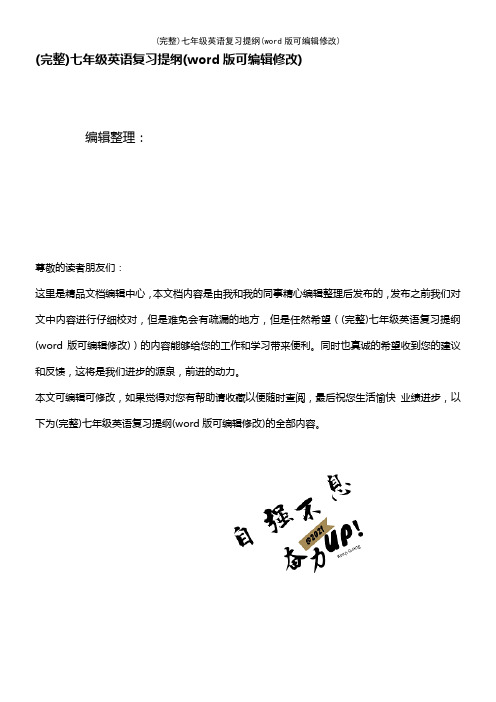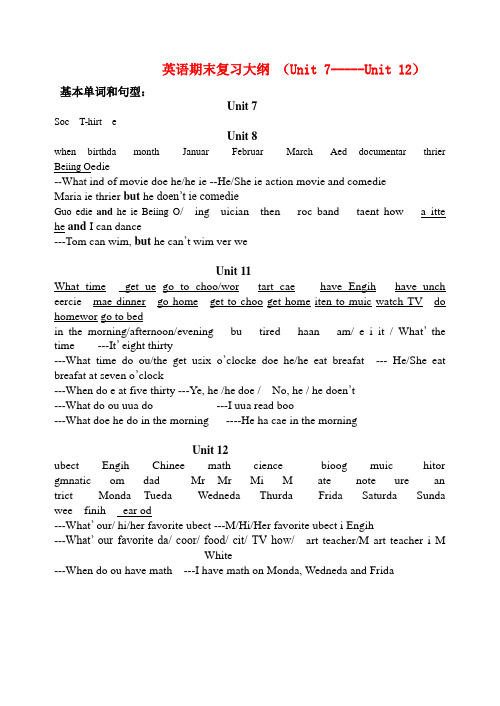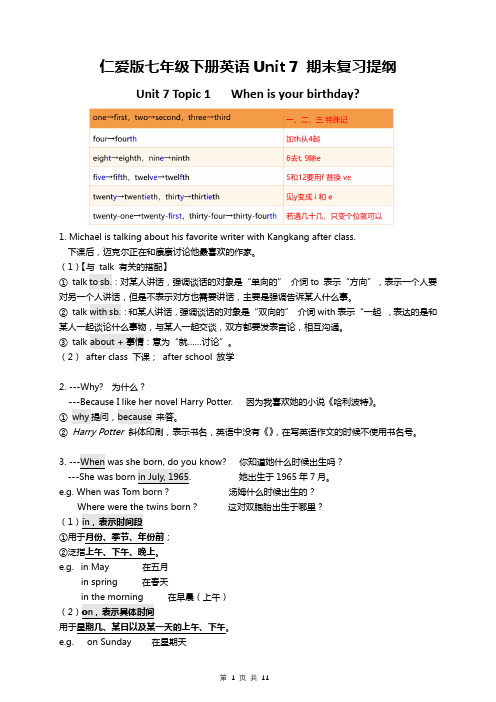7137英语复习提纲
- 格式:doc
- 大小:13.00 KB
- 文档页数:1

(完整)七年级英语复习提纲(word版可编辑修改)编辑整理:尊敬的读者朋友们:这里是精品文档编辑中心,本文档内容是由我和我的同事精心编辑整理后发布的,发布之前我们对文中内容进行仔细校对,但是难免会有疏漏的地方,但是任然希望((完整)七年级英语复习提纲(word版可编辑修改))的内容能够给您的工作和学习带来便利。
同时也真诚的希望收到您的建议和反馈,这将是我们进步的源泉,前进的动力。
本文可编辑可修改,如果觉得对您有帮助请收藏以便随时查阅,最后祝您生活愉快业绩进步,以下为(完整)七年级英语复习提纲(word版可编辑修改)的全部内容。
七年级英语复习提纲Unit 1 Where's your pen pal from?一.短语:1 .be from = come from 来自于—-——2. live in 居住在-——3. on weekends 在周末4 .write to sb = write a letter to sb 给某人写信;写信给某人5 .in the world 在世界上 in China 在中国6.pen pal 笔友 14 years old 14岁 favorite subject 最喜欢的科目7.the United States 美国 the United Kingdom 英国 New York 纽约8.speak English 讲英语 like and dislike 爱憎9.go to the movies 去看电影 play sports 做运动二.重点句式:1 Where's your pen pal from? = Where does your pen pal from/2 Where does he live?3 What language(s) does he speak?4 I want a pen pal in China.5 I can speak English and a little French.6 Please write and tell me about yourself。

英语期末复习大纲(Unit 7-----Unit 12)基本单词和句型:Unit 7Soc T-hirt eUnit 8when birthda month Januar Februar March Aed documentar thrier Beiing O edie--What ind of movie doe he/he ie --He/She ie action movie and comedieMaria ie thrier but he doen’t ie comedieGuo edie and he ie Beiing O/ ing uician then roc band taent how a itte he and I can dance---Tom can wim, but he can’t wim ver weUnit 11What time get ue go to choo/wor tart cae have Engih have unch eercie mae dinner go home get to choo get home iten to muic watch TV do homewor go to bedin the morning/afternoon/evening bu tired haan am/ e i it / What’the time ---It’ eight thirty---What time do ou/the get usix o’clocke doe he/he eat breafat --- He/She eat breafat at seven o’clock---When do e at five thirty ---Ye, he /he doe / No, he / he doen’t---What do ou uua do ---I uua read boo---What doe he do in the morning ----He ha cae in the morningUnit 12ubect Engih Chinee math cience bioog muic hitor gmnatic om dad Mr Mr Mi M ate note ure an trict Monda Tueda Wedneda Thurda Frida Saturda Sunda wee finih ear od---What’ our/ hi/her favorite ubect ---M/Hi/Her favorite ubect i Engih---What’ our favorite da/ coor/ food/ cit/ TV how/ art teacher/M art teacher i MWhite---When do ou have math ---I have math on Monda, Wedneda and Frida。

七年级英语上册期末复习计划(提纲)第一:复习单词。
也就是背单词,教会学生按音标背单词,分层教学,一方面要计划适合优生、中等生和后进生要记的单词数量,数量上讲究循序渐进,由少到多。
要学会在句子中背单词。
另一方面,一定要高频次的复习:多说、多练、多背、多用。
第二:重点短语。
按字母顺序和考试常考的短语,归类记忆。
把短语放在句子中记忆,把句子放在对话中背诵,以确保长时间记忆!第三:常考句型。
把七年级上册常考的20个句型,归类记忆,少讲多练。
第四:以练代考。
学生普遍做题较少,导学方案的“你听我说”(听力)、单元自测、训练案、自主训练案,我手里题每天投影做一道题:单项选择、补全对话、完形填空、阅读理解(一天一篇)、词语运用和书面表达。
先限定时间让学生自己做,然后讲解,重点培养做题思路、解题方法和技巧。
网上找到前两年七年级第一学期阶段四质量评估英语试题和期末质量评估英语试题,小测验一下,查漏补缺。
第五:书面表达。
学生写作普遍需要提高,所以利用初中英语单元话题中考对接读写精炼中的话题写作,教会学生写作:思路图示、布局点拨、句型参考、范文借鉴、写作实践、难点突破、创作体验。
总之,从单词、短语、句型、阅读、写作和做题方法与技巧,让学生形成知识网络,能学、会学、爱学。
一、制订合理复习计划期末考试复习内容多、任务重、时间紧,要想在短时间里把整个学期的学习内容复习好,就要制订科学合理的计划,有的放矢,达到复习的“获得感”。
在制订计划时同学们必须注意:1.针对教材,合理安排复习时间,每天按时按量完成复习任务。
2.结合错题,找出自己的薄弱环节,每天复习的内容要有重点。
3.循序渐进,量力而行,每次复习内容不要贪多,俗话说“贪多嚼不烂”,也会因为任务过多导致疲惫放弃。
二、注重基础知识复习同学们要立足教材,复习时以课本上的知识点为主线进行系统的梳理,构架较为完整的“知识树”。
在复习过程中要以听,说,读,写为主要形式和抓手,全面排查学得不扎实的薄弱环节,从单词、词组、句型、句子到短文。

七年级下册英语复习提纲Unit 7Vocabulary•Words related to activities and leisure time•Words related to hobbies and interestsGrammar•Present Continuous tense: verb+ing•Can for ability and possibility•Comparative form of adjectives•Use of ‘too’ and ‘enough’•‘Have to’for obligation and ‘don’t have to’ for absence of obligation Reading Comprehension•Understand and answer questions based on given passages•Identify the main idea and supporting details of a text•Draw conclusions from a text•Make predictions based on the information providedSpeaking•Express opinions about various activities and hobbies•Ask and answer questions about leisure activities and interests•Use Present Continuous tense to talk about what is happening currently•Discuss plans for future activitiesWriting•Write a short paragraph about personal hobbies and interests•Write an email inviting a friend to join an activity or event•Write a passage describing a picture or a photoUnit 8Vocabulary•Words related to travel and transportation•Words related to asking for and giving directionsGrammar•Present Continuous tense for future plans•Prepositions of place•Use of ‘there is’ and ‘there are’•Use of ‘some’ and ‘any’•Use of ‘how much’ and ‘how many’•Use of imperatives for giving directionsReading Comprehension•Understand and answer questions about travel-related passages •Identify the main idea and supporting details in a text•Make inferences and draw conclusions from a textSpeaking•Ask and answer questions about travel experiences•Give and follow directions to different places•Express preferences and opinions about travel destinations Writing•Write a short paragraph about a memorable travel experience•Write a dialogue asking for and giving directions•Write a postcard or a letter describing a travel destinationUnit 9Vocabulary•Words related to school subjects and activities•Words related to school facilities and objectsGrammar•Present Simple tense for habit and routine•Prepositions of time•Use of ‘have’ and ‘has’ for possession•Use of ‘like’ and ‘don’t like’ for preferences•Use of ‘not’ to make negative statementsReading Comprehension•Understand and answer questions about school-related passages •Identify the main idea and supporting details of a text•Make predictions and draw conclusions from a textSpeaking•Ask and answer questions about school life and activities•Express preferences for different subjects•Talk about daily routine and habitsWriting•Write a short paragraph about favorite school subjects•Write an article about a school facility or object•Write a note or a message to a teacher or a classmateUnit 10Vocabulary•Words related to health and healthy habits•Words related to feelings and emotionsGrammar•Present Simple tense for general truths and habits•Use of ‘I am’ and ‘I feel’ to express feelings•Use of ‘like’ and ‘hate’ to express preferences•Use of ‘must’ and ‘mustn’t’ for advice and prohibitionReading Comprehension•Understand and answer questions about texts related to health and emotions•Identify the main idea and supporting details of a text•Make inferences and draw conclusions from a textSpeaking•Ask and answer questions about health and well-being•Express feelings and emotions•Give advice and suggestions for a healthy lifestyleWriting•Write a short paragraph about healthy habits•Write a letter to a friend giving advice for a healthier lifestyle•Write a diary entry expressing emotions and feelings。

仁爱版七年级下册英语Unit 7 期末复习提纲Unit 7 Topic 1 When is your birthday?1. Michael is talking about his favorite writer with Kangkang after class.下课后,迈克尔正在和康康讨论他最喜欢的作家。
(1)【与talk 有关的搭配】①talk to sb.:对某人讲话,强调谈话的对象是“单向的” 介词to 表示“方向”,表示一个人要对另一个人讲话,但是不表示对方也需要讲话,主要是强调告诉某人什么事。
②talk with sb.:和某人讲话,强调谈话的对象是“双向的” 介词with表示“一起,表达的是和某人一起谈论什么事物,与某人一起交谈,双方都要发表言论,相互沟通。
③talk about + 事情:意为“就……讨论”。
(2)after class 下课;after school 放学2. ---Why? 为什么?---Because I like her novel Harry Potter. 因为我喜欢她的小说《哈利波特》。
①why提问,because 来答。
②Harry Potter斜体印刷,表示书名,英语中没有《》,在写英语作文的时候不使用书名号。
3. ---When was she born, do you know? 你知道她什么时候出生吗?---She was born in July, 1965. 她出生于1965年7月。
e.g. When was Tom born?汤姆什么时候出生的??这对双胞胎出生于哪里?(1)in,表示时间段①用于月份、季节、年份前;②泛指上午、下午、晚上。
e.g. in May 在五月in spring 在春天在早晨(上午)(2)on,表示具体时间用于星期几、某日以及某一天的上午、下午。
on the morning of October 13th 在10月13日的上午4. ---When is your birthday, Kangkang? 康康,你的生日是什么时候?---May 13th. 5月13日。

千里之行,始于足下。
典范英语初一期末复习提纲典范英语初一期末复习提纲一、词汇复习:1. 基础词汇:认识并默写基础词汇及其词义。
2. 词组搭配:掌握常用的词组搭配,如go to school, play basketball 等。
3. 短语动词:掌握一些常用的短语动词,如bring up, take off等。
二、语法复习:1. 时态:掌握一般现在时、一般过去时和一般将来时的用法及构成。
2. 代词:掌握人称代词、物主代词和指示代词的用法及其变化。
3. 形容词比较级和最高级:掌握形容词比较级和最高级的构成及用法。
4. 名词复数:掌握名词复数的构成规则及不规则变化。
5. 冠词:掌握冠词的用法,包括不定冠词a/an和定冠词the。
三、阅读理解:1. 阅读短文:掌握阅读短文的基本技巧,如快速浏览、找关键词等。
2. 理解文章:能够理解文章的大意和关键信息。
3. 回答问题:能够根据文章内容回答相关问题。
四、写作训练:1. 熟练书写:熟练掌握英文字母的书写规范。
2. 写句子:通过模仿和练习,熟练运用所学的句型写出简单的句子。
3. 作文训练:练习写一些简单的作文,如介绍自己、描述家人等。
五、口语练习:第1页/共2页锲而不舍,金石可镂。
1. 听力练习:通过听力材料进行口语练习,提高听力理解能力。
2. 口语表达:通过角色扮演等方式,练习口语表达能力。
典范英语初一期末复习提纲,主要围绕词汇、语法、阅读理解、写作训练和口语练习五个方面展开,旨在加深对英语基础知识及技能的理解和掌握。
通过逐一复习并进行练习,能够提高学生的英语综合能力,为期末考试做好充分准备。
最新最全2023年七年级英语上册复习提
纲(知识点总汇)
词汇与语法
- 词汇量扩展
- 动词的变化形式
- 常用名词及其复数形式
- 形容词的比较级和最高级
- 常见介词的用法
- 简单句与复合句
- 主语和谓语的搭配
- 常见句型的用法
- 连词的使用及连词短语的运用
- 冠词和指示代词
- 不定冠词与定冠词的用法
- 指示代词的分类及用法
- 时态与语态
- 一般现在时与一般过去时- 进行时和完成时态
- 被动语态的构成和用法
听力与口语
- 日常生活用语
- 问候与道别
- 对时间和日期的表达
- 规划和描述活动
- 能力描述和要求
- 描述人物外貌和性格
- 询问他人的能力和要求- 表达自己的能力和要求
- 问答与对话练
- 基本问句的构成
- 口语对话中的常用表达- 听力训练和问题回答
- 场景对话与小组讨论
- 在不同场景中的自我介绍和交流- 小组讨论的技巧和表达方式
- 同伴互动和角色扮演
阅读与写作
- 文本理解技巧
- 阅读文章的标题和首尾句
- 掌握主旨和信息的提取技巧
- 根据文章推测答案
- 日常生活话题写作
- 描述自己的家庭和朋友
- 记述日常活动和研究情况
- 书写简单的邀请和告示
- 阅读文章写作
- 根据提示写一篇短文
- 回答问题并用完整的句子写作- 写作时注意语法和拼写问题
- 口头表达与写作训练
- 口头描述图片和照片
- 根据提示写一篇30词左右的短文
- 阐述自己的观点并提供理由
以上为2023年七年级英语上册复习的知识点总汇,希望能对学习有所帮助。
人教版七年级英语上册(部编2023) 期末复习提纲Unit 1: Greetings and Introductions- Greeting people and responding- Introducing oneself and others- Asking and answering personal information questions- Making simple conversations using greetings and introductionsUnit 2: My Family- Describing family members and their characteristics- Talking about family relationships- Using possessive adjectives to describe family members- Sharing information about one's familyUnit 3: School Life- Talking about daily school routines- Describing classroom objects and places- Discussing subjects and school activities- Expressing likes and dislikes about school lifeUnit 4: Hobbies and Interests- Talking about hobbies and interests- Describing activities related to hobbies- Expressing preferences and opinions about hobbiesUnit 5: Food and Drinks- Describing food and drinks- Talking about likes and dislikes of food- Ordering food and drinks at a restaurant- Expressing preferences for different types of foodUnit 6: Colors and Clothes- Learning different colors in English- Describing clothes and their colors- Talking about clothing preferences and styles- Discussing appropriate clothing for different occasionsUnit 7: Numbers and Telling Time- Learning and pronouncing numbers in English- Talking about dates and birthdays- Telling time and discussing daily schedules- Expressing time using both analog and digital formatsUnit 8: Daily Activities- Discussing daily activities and routines- Talking about leisure activities and free time- Using time expressions to describe daily routinesUnit 9: Places in the City- Describing different places in a city- Giving directions to navigate through a city- Talking about likes and dislikes of places- Discussing activities to do in different locationsUnit 10: Occupations and Aspirations- Learning and pronouncing different occupations- Talking about future aspirations and dreams- Describing job responsibilities and characteristics- Discussing personal interests related to future careersUnit 11: Weather and Seasons- Describing different weather conditions- Talking about seasons and their characteristics- Discussing favorite seasons and weather preferences- Expressing feelings and emotions about the weatherUnit 12: Holidays and Celebrations- Learning about different holidays and celebrations- Describing traditions and customs of specific holidays - Talking about personal experiences during holidays- Expressing wishes and greetings for different occasionsUnit 13: Daily Routines- Talking about daily activities and schedules- Using adverbs of frequency to describe routines- Discussing preferences for different activities- Expressing opinions about daily routinesUnit 14: Health and Body- Describing body parts and their functions- Discussing healthy habits and lifestyle choices- Giving advice for maintaining good healthUnit 15: Shopping- Talking about different types of shops and stores- Describing items for sale and their prices- Discussing shopping preferences and habits- Asking for help and making purchases at a storeUnit 16: Transportation- Learning and pronouncing different modes of transportation - Talking about means of transportation and their features- Describing travel experiences and preferences- Asking for transportation information and directionsUnit 17: Countries and Nationalities- Learning and pronouncing different countries and nationalities - Talking about one's own and others' nationalities- Discussing cultural characteristics and traditionsUnit 18: Daily Life in Different Countries- Learning about daily life customs in different countries- Talking about cultural differences and similarities- Discussing traditional food, clothing, and activities- Sharing personal experiences or knowledge about other countries- Talking about different types of technology and devices- Describing how technology is used in daily life- Discussing advantages and disadvantages of technology- Expressing opinions about technology and social mediaUnit 20: Review and Assessment- Reviewing key vocabulary and grammar points from previous units- Practicing listening, speaking, reading, and writing skills请根据这个提纲来复习人教版七年级英语上册的内容。
713基础英语提纲一、前言。
二、词汇部分。
(一)词汇的重要性。
咱先说说词汇哈。
词汇就像是盖房子的砖头 ,没有足够的砖头,你咋能盖起一座漂亮的英语大厦呢?你想啊,如果在阅读的时候,满篇都是生词,就像你走在一个到处都是坑的路上,磕磕绊绊的,根本没法顺利前行。
比如说,你看一个句子“He is a sagacious man.”要是不认识“sagacious”这个词,你可能就完全不知道这句话在说啥,其实这个词是“睿智的”的意思。
所以啊,词汇量越大,我们理解英语就越轻松。
(二)词汇积累的方法。
那咋积累词汇呢?方法可多了去了。
1. 背单词书。
这是最传统的方法啦。
找一本靠谱的单词书,像那种有例句、有简单解释的。
每天给自己定个小目标,比如说背30个单词。
早上背一遍,晚上复习一遍,这样就不容易忘。
不过背单词书有点枯燥,就像吃没有味道的馒头,得有点毅力才行。
2. 看剧学单词。
3. 阅读中积累。
读英语文章也是个好办法。
可以是简单的英语小故事,也可以是新闻。
在阅读的过程中,把那些影响你理解文章的单词记下来。
比如说读一篇关于环保的文章,里面有个“sustainable”,你不认识,查了之后知道是“可持续的”,以后再看到这个词就熟悉啦。
三、语法部分。
(一)语法的意义。
语法呢,就像是房子的框架。
有了框架,砖头才能稳稳地垒起来。
如果词汇是肉,那语法就是把肉串起来的竹签。
比如说,“I love she”这就是个典型的语法错误,正确的是“I love her”。
没有正确的语法,我们表达出来的句子就会让人摸不着头脑,就像把零件胡乱拼凑起来的机器,根本没法正常运转。
(二)重点语法点。
1. 时态。
时态可是语法里的一个大板块。
像一般现在时,我们经常用来表示经常发生的事情或者客观事实,比如说“The sun rises in the east.”(太阳从东边升起,这是客观事实)。
还有一般过去时,用来描述过去发生的事情,比如“I went to the park yesterday.”(我昨天去了公园)。
英语七年级期末综合复习提纲一.代词 (pron.)第一人称单数第二人称单数和复数第三人称单数(三单)第一人称复数第三人称复数人称代词我你 / 你们他她它我们他们主格 I you he she it we they宾格 me you him her it us them物主代词我的你的/ 你们的他的她的它的我们的他们的形容词性 my your his her its our their(一) 翻译成英语:1.我是¬¬¬¬¬_______________ 2.我父母¬¬¬¬¬________________ 3.你可以______________4.你的电话号码______________5. 谢谢你_____________6. 他有________________ 7.他的姓氏_____________8. 听他说_____________ 9.她喜欢它。
____________10.她全家照______________ 11.帮助她____________ 12. 它吃________________ 13.它名字______________14.看见它____________ 15.我们想要____________16.我们最喜爱的水果_____________________17.加入我们_________18. 他们唱歌___________19.他们旧电脑_______________20.画出它们__________(二) 选词填空:1.What’s ________ name? (you / your )_________ name is Bob. ( My / I / me)2._________ erasers are in ________drawer. (her / she / Her / She)3.Can ________(you / your ) do _______ (you/ your ) homework?4.___________ is a cat. ________ name isMimi. ( it / its / It / Its )5._________ brother can speak Japanese. (He’s / His / He )6.Please take _________ keys to school. __________ are on the table.( they / their / them / They / Their / Them )7.__________ is thirteen years old. __________ birthday is March 1st. (He / His / Him)8.__________ favorite vegetable is tomato. (her / she / Her / She)9.Can you help ______ ?( we / us / our) Please take ______ to school. ( they / their / them)10._________ can’t see _________baseball. It’s behind _________.( My / I / me / my ) (三)完成句子:1. A: What’s this / that ?B: _________ is a dresser.A: How do you spell _________ , please ?B: D-R-E-S-S-E-R.2. A: What are these / those ?B: _________ are tomatoes.3. A: Does Cindy like salad?B: No, _________doesn’t.4. A: How much are his shoes?B: _________ are 100 dollars.5. A: Is Alan your friend?B: Yes, _________ is.6. A: Do you have a soccer ball?B: Yes, _________ do.7. A: Who is that girl?B: _________ is Jack’s sister.’8. This is David and this is Tim . _________ are our friends. We often help_________ .9. Those are strawberries. Sally likes_________.10. The pants are nice. I’ll take _________.一.代词 (pron.)第一人称单数第二人称单数和复数第三人称单数(三单)第一人称复数第三人称复数人称代词我你 / 你们他她它我们他们主格 I you he she it we they宾格 me you him her it us them物主代词我的你的/ 你们的他的她的它的我们的他们的形容词性 my your his her its our their(一) 翻译成英语:1.我是¬¬¬¬¬_______________ 2.我父母¬¬¬¬¬________________ 3.你可以______________4.你的电话号码______________5. 谢谢你_____________6. 他有________________ 7.他的姓氏_____________8. 听他说_____________ 9.她喜欢它。
贵州广播电视大学2017—2018学年度第一学期期末考试
(成人专科)《英语》复习提纲
1. 能够正确运用可数名词及其单复数、不可数名词、名词所有格的基本形式。
正确使用人称代词、物主代词、反身代词、指示代词、不定代词。
2.能够识别介词和介词短语、形容词(比较级和最高级)、副词(比较级和最高级)、冠词。
3. 正确运用系动词Be的各种形式、区分及物动词和不及物动词、掌握助动词和情态动词。
4. 能够根据不同场合选用合适的时态,包括一般现在时、一般过去时、一般将来时、现在进行时、现在完成时。
5.能够识别被动语态和主动语态,了解非谓语动词形式,包括动词不定式、动词的-ing形式、动词的-ed形式。
6. 能够区分不同的基本句型,如宾语从句、状语从句、定语从句、主语从句、表语从句。
7.能够正确运用常见的功能句式,包括问候、自我介绍、告别、感谢、道歉、邀请、打电话;表达基本的态度和情感,如喜欢和讨厌、肯定和怀疑、可能和不可能、能够和不能够、希望和愿望、表扬和鼓励、高兴、惊奇、满意等。
8.对时间、空间、存在的英语表达方式有一定的了解。
9.运用个人基本情况进行会话,包括个人情况、家庭、朋友与周围的人、周围的环境、日常活动、学校生活、兴趣与爱好、计划与愿望、节假日活动、购物、天气、文娱与体育。